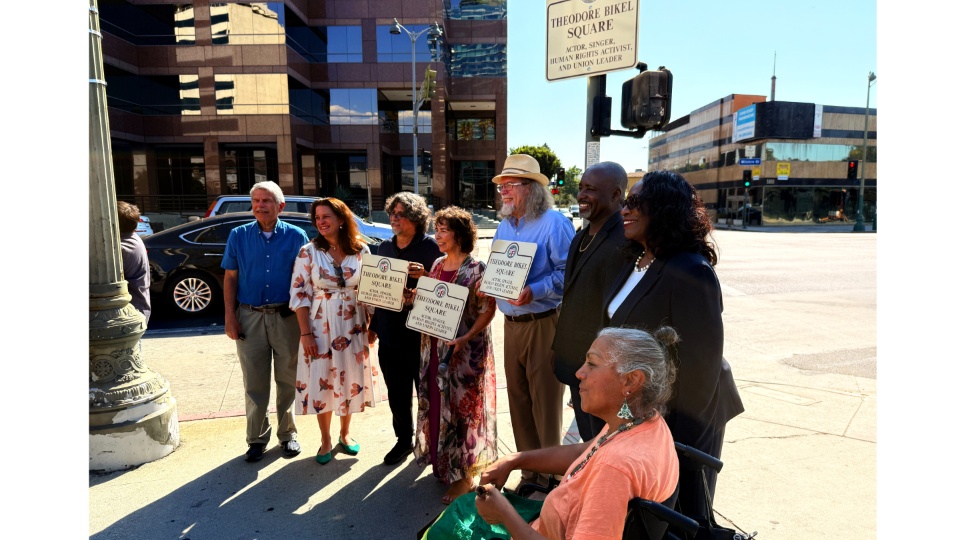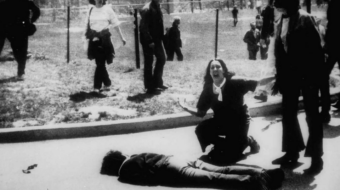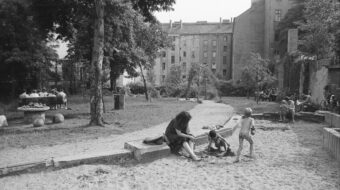
LOS ANGELES — As of Sunday, October 6, there’s a new address in Los Angeles. Well, maybe not an address, because there’d be no place to deliver a letter there. But there’s now a street intersection named Theodore Bikel Square, and well over 100 people turned out to celebrate the world-famous singer, actor, and social activist in this, his centennial year, nine years after his passing at the age of 91 in 2015.
It’s not so easy to get honorary place markers installed in a huge, bureaucratic city like L.A. But Theo, as he was known to many, had a lot of friends. The corner of Wilshire Boulevard at S. Curson Ave. in the heart of Miracle Mile, is immediately adjacent to the La Brea Tar Pits and the Los Angeles County Museum of Art, so it has a good deal of foot traffic going by.
But just a few steps to the east of that corner, on the north side of Wilshire, stands the SAG-AFTRA headquarters, the screen actors’ union that Bikel joined in 1954 and which he later served as President. After first joining Actors Equity in 1954, he became a member of its council in 1962 and would serve as its first vice president and then, a decade later, as president from 1973-1982. Bikel went on to serve as president of the Associated Actors and Artistes of America in 1987 until his passing in 2015. He joined AFTRA in 1955 and SAG in 1957.
He was in fact an active member of all five performing artist unions, as well as numerous human rights and civil rights organizations. He was president of the Actors’ Equity Association 1973-82, and of the Associated Actors and Artistes of America 1987-2015, and a co-founder of the Actors’ Federal Credit Union. He made profound lifetime contributions to labor and the arts, leaving a lasting impact on the creative community.
A ceremonial unveiling of the Theodore Bikel Square plaque took place shortly after 2 p.m., marked by greetings from 5th District City Councilwoman Katy Yaroslavsky, from her father-in-law, former County Supervisor Zev Yaroslavsky, City Council President Marqueece Harris-Dawson, Yvonne Wheeler, President of the L.A. County Federation of Labor, and his last wife, journalist Aimee Ginsburg Bikel, whom he married in 2013 and who now directs the Theodore Bikel Legacy Project. A prominent guest at the unveiling was Tina Orduno Calderon, a Culture Bearer of Gabrielino, Tongva, Chumash and Yoeme descent, who sang the call to remember the ancestors, as well as the living descendants of the original Native peoples on the land. Considering Theodore Bikel’s life and passionately held principles, the land acknowledgment was of special import (see below).
Following the short ceremony the audience retired into the SAG-AFTRA Plaza for a reception, prayer offering, tributes and musical performance. Union president Fran Drescher, unable to be present, taped a video greeting, saying, “May this land remain as a sanctuary of positivity and hope.”

About Theodore Bikel
Born in Vienna on May 2, 1924, Bikel wore many hats in his long, productive life: award-winning actor of stage, screen and television, musician, singer (in 21 languages), songwriter, author, teacher, labor leader, and outspoken humanitarian.
On Broadway, he was the original Captain Von Trapp in The Sound of Music, for whom the famous song “Edelweiss” was composed. In the 1964 film My Fair Lady, Bikel played a Hungarian phonetics expert who attempts to unmask Eliza Doolittle (Audrey Hepburn) as a fraud, declaring her…a fellow Hungarian! In 1967, he first played the lead role of Tevye in the original national touring company of Fiddler on the Roof and went on to play the role in subsequent productions more than any other actor—over 2000 performances.
Television viewers saw him play comedy and drama in multiple categories of programming from the 1950s to the 2000s: classic mystery dramas Alfred Hitchcock Presents and The Twilight Zone; westerns Wagon Train, Rawhide, Gunsmoke; crime series Columbo, LA Law, Law & Order and Murder, She Wrote; science fiction shows Star Trek: The Next Generation, Babylon 5, and a poignant serio-comic turn in two episodes of All in The Family.
On film he played an estimated 150 roles, one alongside Humphrey Bogart and Katherine Hepburn in The African Queen, and as a Southern sheriff in The Defiant Ones, for which he was nominated for an Academy Award. In one sci-fi film he appeared as the first rabbi in outer space.
As a singer who could accompany himself on guitar, mandolin, balalaika and harmonica, he recorded more than 20 albums, many of them in Hebrew, Yiddish and Russian, and he co-founded the Newport Folk Festival with Pete Seeger.
President Jimmy Carter appointed Bikel to a five-year term on the National Council on the Arts in 1977. He was a vice president of The International Federation of Actors/Fédération Internationale des Acteurs (FIA) from 1981-1991, which brought him several times to meetings in Moscow, a board member of Amnesty International, senior vice president of the American Jewish Congress, and board chair of Partners for Progressive Israel (formerly known as Meretz USA). He was awarded numerous honors and degrees, including a a star on Hollywood’s Walk of Fame. The AFL-CIO convention in September 2009 honored Bikel with a resolution for his accomplishments as “the epitome of a Renaissance Man. Not content with a robust and diverse résumé as a multi-hyphenate performer, Theodore Bikel also leads a life committed to social justice.”
The themes of justice and displacement dominated Bikel’s life. At the age of 13, he was subjected to violent beatings as a Jewish student in Vienna in the aftermath of the Nazi Anschluss in 1938. His family was forced to move, and they landed in Mandate Palestine, where he lived for the next eight years, then moving to London to study acting.

As he told Amy Goodman in a Democracy Now interview in 2014, not long before he died, he went back to Vienna for the first time “with honors, and they’ve asked me to observe the 75th anniversary of Kristallnacht in a very solemn…occasion in the Parliament of Austria. But all these years, I smarted under the notion that a human being was told to get out. And that was me—not only to get out, but to leave behind everything that was precious to him, especially the books.”
That experience informed his worldview, and he applied its lesson universally. He was active in the Soviet Jewry campaign as well as in the anti-apartheid movement, for which he was arrested, as he was also in Birmingham during the civil rights protests. In the segregated Birmingham jail he led two choruses of prisoners—one Black, one white—in song. He opposed a 2013 Israeli plan to uproot 40,000 Bedouins from their ancestral lands: “One thing that is absolutely clear in my mind is that human beings cannot be treated like cattle…. Human beings must be given the dignity and the respect that all human beings deserve, especially by a people who themselves—Jews—have experienced such deprivation in the past.”
In a video he produced for Rabbis for Human Rights, titled “Fiddler with No Roof,” he said:

My name is Theodore Bikel, and I want to ask you to help prevent a terrible moral tragedy. I’ve spent much of my life playing Tevye in ‘Fiddler on the Roof.’ I see parallel with what is happening today. Forty thousand Bedouins in the Negev desert are being told to get out of their homes. Remember the scene in ‘Fiddler on the Roof’ when the Russians arrive and tell them they have three days to get out. Tevye says, “Why should I get out?” They said, “Not just you. All of you.” They said, “Why? Why should we leave?” “I don’t know why. I have an order here.” It’s a piece of paper, and “Get thee out.” “What if we refuse to leave?” We know the consequences of refusal.
“You know,” Bikel would often tell this story, “over a hundred years ago, that slogan that people used to yell at other people, ‘My country, right or wrong!’ was answered by a former general and senator, Carl Schurz, who said, indeed, ‘When right to be kept right, and when wrong to be put right.’ I believe that to be true of America. I believe that to be true of Israel.”
In that spirit, in 2003, Bikel endorsed “A Call to Bring the Settlers Home to Israel,” recognizing that their land claims on the West Bank were jeopardizing any eventual political settlement between Israel and Palestine.
One of his few regrets in life, his widow recounted, was that he came to the United States in 1954, too late to get on the Blacklist. But he made up for it on his radio show, where he invited as many of the blacklisted artists as he could. She also mentioned that as the actors’ union president, when he went on the road for his concerts and on-location gigs, he would meet his fellow local union members and urge them not to give up their dignity and accept less than honorable contracts.
The afternoon concluded with Cantor Michael Stein and his family—he calls them “The Rolling Steins” in some Yiddish songs, followed by an ensemble brought together as a performing outreach group of the Los Angeles Jewish Symphony under Noreen Green doing a selection of hit numbers from—of course—Fiddler on the Roof.
It was a memorable salute to one of L.A.’s labor heroes, a beloved performer in many genres who made a difference in this world, and whose name now permanently graces the corner of Wilshire and Curson. Theo Bikel ¡presente!
We hope you appreciated this article. At People’s World, we believe news and information should be free and accessible to all, but we need your help. Our journalism is free of corporate influence and paywalls because we are totally reader-supported. Only you, our readers and supporters, make this possible. If you enjoy reading People’s World and the stories we bring you, please support our work by donating or becoming a monthly sustainer today. Thank you!










